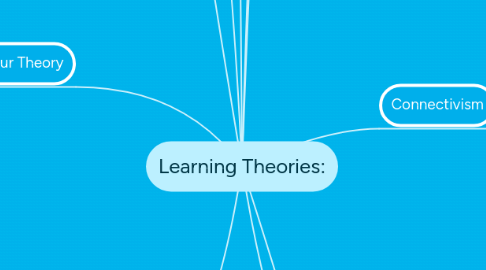
1. Connections between Theories
1.1. Connections between learning and technology: Connectivism, Media Ecology, Social Construction of Technology
1.2. Connections between learning and Social Context: Constructivism, Cognitive Load Theory, Behaviorism, Social Construction of Technology
1.3. Connections between Learning and Cognitive Thinking: Cognitive Load Theory, Constructivism, Behaviorism, Connectivism, Social Construction of Technology, Media Ecology
2. Media Ecology
2.1. Implications for Education
2.1.1. Teachers need to be made aware of how environment (structures, content) impacts people and their learning
2.1.2. How can we use media ecology to benefit our student's learning
2.1.3. How could poor learning environments have an affect on our students?
2.2. Basic Principles
2.2.1. study of media environments (the idea that technology and techniques), modes of information and codes of communication play a leading role in human affairs
2.2.2. Move away from the rigid compartmentalized, uncoordinated specializations in scientific inquiry and move towards the increasing integration of both the physical and the social sciences
2.2.3. Compound of various disciplines/subjects, and new fields of inquiry
2.2.4. many definitions
2.2.5. Looks into the matter of how media of communication affect human perceptions, understanding, feeling, and value; and how our interactions with others facilitates or impedes our chances of survival
3. Cognitive Load Theory (CLT)
3.1. Implications for Education
3.1.1. Teachers have to be careful not to 'overload' their student's working memory
3.1.2. Teachers need to find ways to move knowledge/information tot he long-term memory
3.2. Basic Principles
3.2.1. Working memory can only handle so much information, overload occurs when too much information is processed too fast
3.2.2. Long Term Memory is unlimited and assists working memory
3.2.3. Schemas are memory structures written in long-term memory by the working memory
3.2.4. Automation (doing something without conscious thought) is the results from well developed schemas due to working memory's interaction with long-term memory
4. Behaviour Theory
4.1. Implications for Education
4.1.1. discovering the best consequences to shape behaviour
4.1.2. Consequences can be positive and negative reinforcements- rewarding and punishing
4.2. Basic Principles
4.2.1. Memory focused on associations being made between events such as lightning and thunder
4.2.2. learning as a complex process of responses to several kinds of distinct stimuli
4.2.3. conditions of deprivation and satiation, and other changes in the environment
4.2.4. Skinner, holds that the mind at work cannot be observed, tested, or understood; thus behaviorists are concerned with actions (behavior) as the sites of knowing, teaching, and learning
5. Technology Pedagogy Content Knowledge (TPACK)
5.1. Basic Principles:
5.1.1. used to understand and describe the kinds of knowledge needed by a teacher for effective pedagogical practice in a technology enhanced learning environement
5.1.2. Technology= technical knowledge (ability to use software, computers, programs, etc.
5.1.3. Content Knowledge= subjects/topics (what we as teachers try to convey
5.1.4. Pedagogical knowledge= how we teach
5.1.5. how all 3 (technology, content, and pedagogy work together to support good teacher
6. Connections between TPACK and Teachnology
6.1. Both encourage the incorporation of technology into the classroom
6.2. Both encourage teachers to use multiple multimedia sources and tools
6.3. Both encourage the instructor to be familiar with the technological tools they are using
7. Social Construction of Technology (SCOT)
7.1. Basic Principles
7.1.1. is a field of learning that argues that technology does not determine human action, but that human action shapes technology
7.1.2. the ways in which a technology is used cannot be understood without understanding how that technology is embedded in its social context
7.1.3. response to technological determinism and is sometimes known as technology constructivism
7.1.4. those who seek to understand the reasons for acceptance or rejection of a technology should look to the social world. It's not enough to explain a technology's success by saying that it is "the best"- researchers must look at how the criteria of being 'the best' is defined and what groups and stakeholders participate in defining it.
7.1.5. it formalizes the steps and principles to follow when one wants to analyze the causes of technological failures or successes
7.2. Implications for education/teaching
7.2.1. teachers have to become aware as to how human actions shape technology
7.2.2. Teachers must determine what technologies are best to use in the classroom
7.2.3. they must ask who defines the technical criteria success is measured by, why technical criteria are defines this way, and who is included or excldued
8. Connectivism
8.1. Basic Principles
8.1.1. Knowing where to find information/knowledge is more important that knowing the information itself
8.1.2. Diversity of opinions
8.1.3. Integrating technology with learning through various sources of networking and through various databases and communities
8.2. Implication for Education
8.2.1. Learning happens in many different ways, not just in the classroom
8.2.2. Organization and personal learning skills differ
8.2.3. Learning becomes a process not just a consumption- learning tools and design methods should seek to capitalize on this trait of learning
9. Constructivism
9.1. Implications for Education
9.1.1. Rely on learners having good foundations
9.1.2. Learning is considered a collaborative approach
9.1.3. Learners are considered responsible for their own learning
9.1.4. this approach to learning emphasizes authentic, challenging projects that include students, teachers, and experts in the learning community
9.2. Basic Principles
9.2.1. roots in philosophy, psychology, sociology, and eduction
9.2.2. learning is constructive- learners build new knowledge upon the foundation of previous learning
9.2.3. The learner is considered an active learner
9.2.4. Prior experience is built upon- no blank slate
9.2.5. Learners are confident in their own learning- they can change to accommodate a new experience/knowledge
